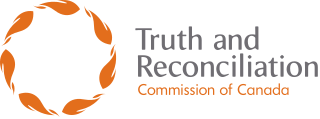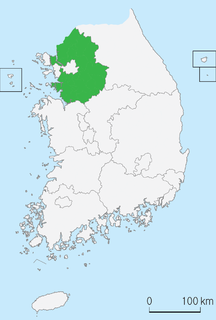The Truth and Reconciliation Commission (TRC) was a court-like restorative justice body assembled in South Africa after the end of apartheid. Witnesses who were identified as victims of gross human rights violations were invited to give statements about their experiences, and some were selected for public hearings. Perpetrators of violence could also give testimony and request amnesty from both civil and criminal prosecution.
Reconciliation may refer to:
Genocide denial is the attempt to deny or minimize the scale and severity of an incidence of genocide. Denial is an integral part of genocide and includes secret planning of genocide, propaganda while the genocide is ongoing, and destruction of evidence of mass killings. According to genocide researcher Gregory Stanton, denial "is among the surest indicators of further genocidal massacres".

uMkhonto we Sizwe was the armed wing of the African National Congress (ANC), co-founded by Nelson Mandela in the wake of the Sharpeville massacre. Its mission was to fight against the South African government.
A peace commission is an organization that operates at a local, regional, or national level within a country to reduce, counter, or prevent conflict. Typically, a peace commission will involve local communities and individuals in the peace building process. A Truth and reconciliation commission is a form of Peace Commission that discovers and reveals past wrongdoings in the hope of resolving conflict left over from the past. The South African Truth and Reconciliation Commission is an example. A commission such as the Southern Sudan Peace Commission is less concerned with the past, and more with finding ways to prevent ongoing ethnic violence from escalating, but instead to move towards a more peaceful society.

A truth commission, also known as a truth and reconciliation commission or truth and justice commission, is an official body tasked with discovering and revealing past wrongdoing by a government, in the hope of resolving conflict left over from the past. Truth commissions are, under various names, occasionally set up by states emerging from periods of internal unrest, civil war, or dictatorship. In both their truth-seeking and reconciling functions, truth commissions have political implications: they "constantly make choices when they define such basic objectives as truth, reconciliation, justice, memory, reparation, and recognition, and decide how these objectives should be met and whose needs should be served".
The Saint James Church massacre was a massacre perpetrated on St James Church of England in South Africa in Kenilworth, Cape Town, South Africa, on 25 July 1993 by four members of the Azanian People's Liberation Army (APLA). Eleven members of the congregation were killed and 58 wounded. In 1998 the attackers were granted amnesty for their acts by the Truth and Reconciliation Commission.
The Equity and Reconciliation Commission is a Moroccan human rights and truth commission created on January 7, 2004 when King Mohammed VI signed a Dahir. This truth commission was established to reconcile victims of human rights abuses, such as torture, forced disappearances and arbitrary arrests, committed by Makhzen during the Years of lead, with the State. It covers 1956 to 1999, spanning the reign of the two previous monarchs. The proclaimed objectives of the commission were the protection and the promotion of the human rights in Morocco.
Transitional justice consists of judicial and non-judicial measures implemented in order to redress legacies of human rights abuses. Such measures "include criminal prosecutions, truth commissions, reparations programs, and various kinds of institutional reforms". Transitional justice is enacted at a point of political transition from violence and repression to societal stability and it is informed by a society’s desire to rebuild social trust, reestablish what is right from what is wrong, repair a fractured justice system, and build a democratic system of governance. The core value of transitional justice is the very notion of justice—which does not necessarily mean criminal justice. This notion and the political transformation, such as regime change or transition from conflict are thus linked toward a more peaceful, certain, and democratic future.
A human rights commission, also known as a human relations commission, is a body set up to investigate, promote or protect human rights.

The Liberian Truth and Reconciliation Commission (TRC) is a Parliament-enacted organization created in May 2005 under the Transitional Government. The Commission worked throughout the first mandate of Ellen Johnson Sirleaf after her election as President of Liberia in November 2005. The Liberian TRC came to a conclusion in 2010, filing a final report and recommending relevant actions by national authorities to ensure responsibility and reparations.

The Truth and Reconciliation Commission of Canada was a truth and reconciliation commission active in Canada from 2008 to 2015, organized by the parties of the Indian Residential Schools Settlement Agreement.

The Solomon Islands Truth and Reconciliation Commission (TRC) is a commission officially established by the government of Solomon Islands in September 2008. It has been formed to investigate the causes of the ethnic violence that gripped Solomon Islands between 1997 and 2003. The Truth and Reconciliation Commission is the first of its kind in the Pacific Islands region.
Truth-seeking processes allow societies to examine and come to grips with past crimes and atrocities and prevent their future repetition. Truth-seeking often occurs in societies emerging from a period of prolonged conflict or authoritarian rule. The most famous example to date is the South African Truth and Reconciliation Commission, although many other examples also exist. Most commonly these are carried out by official truth and reconciliation commissions as a form of restorative justice, but there are other mechanisms as well.
The Truth And Reconciliation Commission Act 2008 is an Act of the eighth National Parliament of Solomon Islands establishing the country's Truth and Reconciliation Commission.

The Goyang Geumjeong Cave massacre was a massacre of over 153 unarmed civilians conducted between 9 October 1950 and 31 October 1950 by police in Goyang, Gyeonggi-do district of South Korea. After the victory of the Second Battle of Seoul, South Korean authorities arrested and summarily executed several individuals along with their families on suspicion of sympathizing with North Korea. The killings in Goyang coincided with the Namyangju massacre in nearby Namyangju.
The Sierra Leone Truth and Reconciliation Commission was created as part of the Lomé Peace Accord, signed on July 7, 1999, which ended the 11 year civil war conflict in Sierra Leone. This accord was signed by then President Ahmad Tejan Kabbah, and the leader of the Revolutionary United Front (RUF) Foday Sankoh. The aims of the Commission were to establish "an impartial historical record of violations and abuses of human rights and international humanitarian law related to the armed conflict in Sierra Leone from the beginning of the Conflict in 1991 to the signing of the Lomé Peace Agreement; to address impunity, to respond to the needs of the victims, to promote healing and reconciliation and to prevent a repetition of the violations and abuses suffered." The Commission was chaired by Bishop Joseph Christian Humper. It operated from 2002-2004, with a final report being presented to the United Nations Security Council on October 5, 2004.
The Truth and Justice Commission of Mauritius was an independent truth commission established in 2009, which explored the impact of slavery and indentured servitude in Mauritius. The Commission was tasked to investigate the dispossession of land, and “determine appropriate measures to be extended to descendants of slaves and indentured laborers.” It was “unique in that it [dealt] with socio-economic class abuses" and explored the possibility of reparations. The inclusion of reparations, whether for individuals or communities, was a controversial decision within the country which aimed to correct inequality. The Commission attempted to cover more than 370 years, the longest period of time that a truth commission has ever covered.





